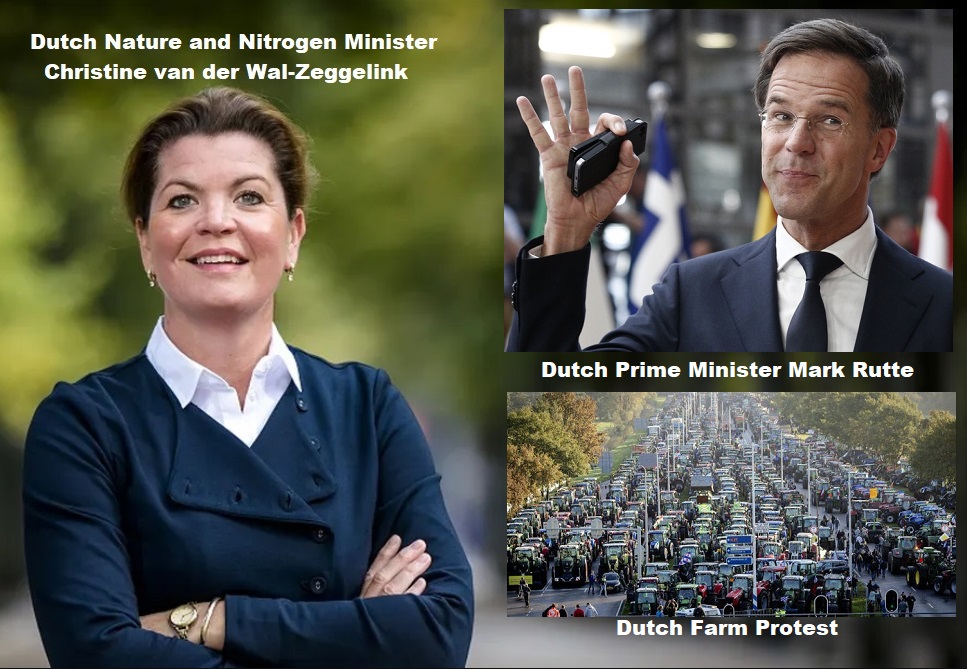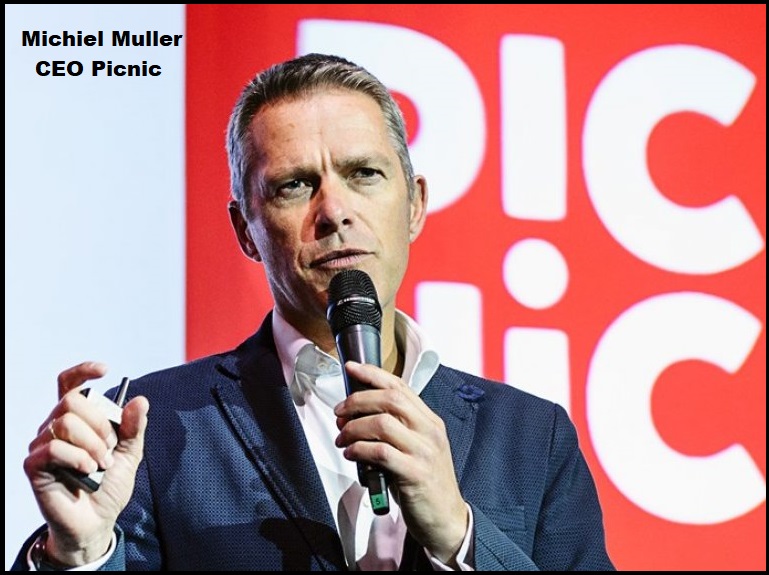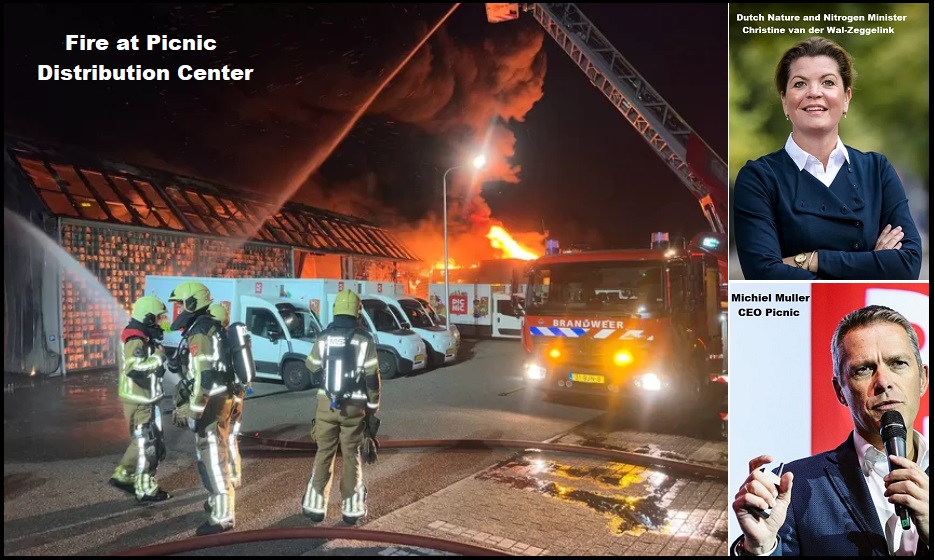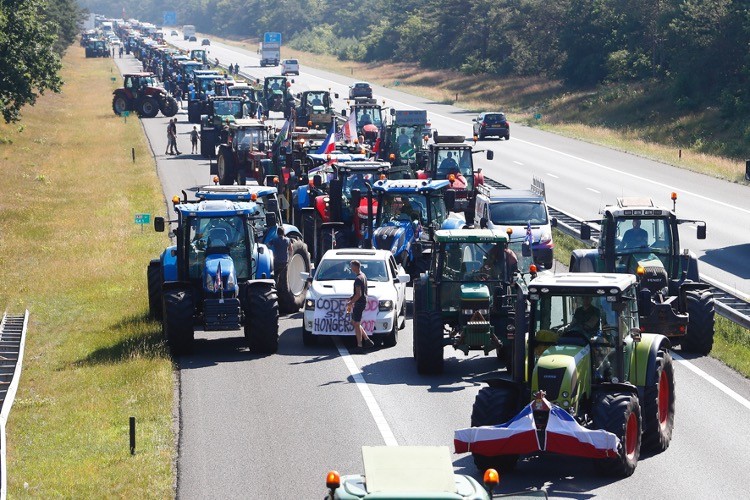You might have heard about an online grocery distribution center called Picnic in the Netherlands burning to the ground {LINK}. The backstory of how the Picnic operation connects to the Dutch government is fascinating, and with context it looks like Picnic was targeted as part of the Dutch farmer protest.
In the Netherlands the government official who organized the regulations to take farmland from farmers and reduce their livestock is a politician named Christianne van der Wal-Zeggelink {wiki link}. Mrs van der Wal-Zeggelink is the current Minister for Nature and Nitrogen Policy in the Dutch cabinet of Prime Minister Mark Rutte.

Minister Christianne van der Wal-Zeggelink and Prime Minister Mark Rutte are climate activists, so it makes sense that the “Minister of Nitrogen Policy” would be the person who would attempt to reduce nitrogen by targeting the farmers. It is Mrs. van der Wal-Zeggelink who created the regulations that the farmers are protesting.
Now, stay with me… Christianne van der Wall-Zeggelink is married to Piet van der Wal, an heir to the wealth of the family who owns a supermarket chain called Boni. {citation} So, when Dutch farmers sell product to Boni they are directly funding the wealth of the government minister who seeks to destroy their livelihoods.
Additionally, when Dutch shoppers spend their money at the Boni supermarket they are funding the family of the government minister who is seeking to destroy the farmers who provide the food to the supermarkets. Do the Dutch farmer blockades of the supermarkets and distribution centers make more sense now?
Here is where it gets interesting…. The supermarket chain Boni is one of a small group of four big investors in the online supermarket chain Picnic. {citation} The van der Wal family was part of a group of investors in 2015 and 2019 who generated €450 million for the Picnic grocery operation.
Additionally, as part of the financial relationship, the Picnic distribution center buys their groceries at wholesale prices from Boni: “Picnic directly buys from an existing supermarket chain (Boni), which saves them the operational costs on that side” {2015, citation}.
Buying from Boni Supermarket or ordering online from Picnic home grocery delivery is essentially the same thing. Boni is a retail supermarket chain, and Picnic is a free home delivery service that sources their grocery distribution center inventory from Boni.
Additionally, Bill and Melinda Gates are big investors into Picnic {citation}: “As reported by the respected Dutch financial magazine Quote in September last year, [Picnic] raised €600 million (approximately $604 million) in an investment round, with the lion’s share coming from the Bill & Melinda Gates Foundation Trust.” {link}
Summary so far: Nitrogen Policy Minister Christianne van der Wal-Zeggelink is married to the ultra-wealthy family who own the Supermarket chain Boni. Together with other ‘climate change’ investors including Bill and Melinda Gates, Boni funds online supermarket Picnic. Sales from Picnic or Boni directly increase the wealth of the Dutch Nitrogen Policy Minister. Picnic also sells the engineered food that Bill Gates promotes.
 The current owner and CEO of Picnic is a man named Michiel Muller. Mr. Muller is a Dutch entrepreneur, climate change activist and self-described visionary, who intends to “change the entire food system, eliminate waste” and be in line with sustainable energy goals and the climate change agenda [Video citation @14:21].
The current owner and CEO of Picnic is a man named Michiel Muller. Mr. Muller is a Dutch entrepreneur, climate change activist and self-described visionary, who intends to “change the entire food system, eliminate waste” and be in line with sustainable energy goals and the climate change agenda [Video citation @14:21].
Additionally, a great deal of the money from the investment rounds is going toward building a robotic warehouse and automated Picnic distribution center which aligns with the free online grocery ordering system. {another citation}
With all of these associations, business interests and financial aspects in mind, Dutch Nitrogen Minister Christianne van der Wall-Zeggelink has a direct financial conflict-of-interest in the advancement of sustainable supermarket and online grocery operations. Specifically, those operators who are the beneficiaries of not only her nitrogen elimination regulation, but also the direct investment from her family.
It is also not surprising that Dutch farmers would seek to block the retail supermarkets and distribution centers of the companies that are directly connected to the business interests of Dutch politicians.


